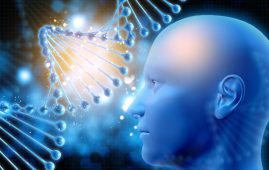

A study published in Nature Metabolism reveals that menstrual cycle timing influences brain insulin sensitivity. The findings are based on an 11-woman randomized clinical trial.
Previous studies have shown that the brain is insulin sensitive and that insulin affects specific neurons in the brain. Insulin has been demonstrated to influence eating habits and whole-body metabolism. It has also been proposed that there may be gender differences in the regulation of whole-body metabolism by brain insulin, however most of the study has been done on men.
Martin Heni and colleagues studied the effect of brain insulin activity on menstrual cycle follicular (first day of cycle to ovulation) and luteal (post-ovulation to last day of cycle) phases in 11 women. The women were subjected to four hyperinsulinemic-euglycemic clamps, which allowed insulin sensitivity to be measured. Intranasal insulin injection was used to evaluate brain insulin activity, which was then compared to a non-insulin placebo spray.
The authors discovered that increased insulin resistance in the brain occurred during the follicular phase of the menstrual cycle, but not during the luteal phase. They performed functional MRI scans on an additional 15 women to test insulin sensitivity in a specific brain region, the hypothalamus, and found that insulin sensitivity was similar during the follicular but not the luteal phase of the menstrual cycle.
According to the scientists, the brain’s insulin resistance is higher during the follicular phase of the menstrual cycle, and that brain insulin resistance may lead to whole-body insulin resistance during the luteal phase.
In an accompanying News & Views article in the same journal issue, Nils Kroemer writes, “The current study provides evidence for the crucial role of insulin in the brain in regulating whole-body insulin sensitivity during the menstrual cycle.
“Flanked by the observed increase in hypothalamic insulin sensitivity, it is plausible that altered hypothalamic projections to motivational circuits could help to explain associated changes in body weight regulation, appetite and food craving that are often reported in a premenstrual (that is, late luteal) phase when central insulin sensitivity is lower.”
more recommended stories
 Caffeine and SIDS: A New Prevention Theory
Caffeine and SIDS: A New Prevention TheoryFor the first time in decades,.
 Microbial Metabolites Reveal Health Insights
Microbial Metabolites Reveal Health InsightsThe human body is not just.
 Reelin and Cocaine Addiction: A Breakthrough Study
Reelin and Cocaine Addiction: A Breakthrough StudyA groundbreaking study from the University.
 Preeclampsia and Stroke Risk: Long-Term Effects
Preeclampsia and Stroke Risk: Long-Term EffectsPreeclampsia (PE) – a hypertensive disorder.
 Statins and Depression: No Added Benefit
Statins and Depression: No Added BenefitWhat Are Statins Used For? Statins.
 Azithromycin Resistance Rises After Mass Treatment
Azithromycin Resistance Rises After Mass TreatmentMass drug administration (MDA) of azithromycin.
 Generative AI in Health Campaigns: A Game-Changer
Generative AI in Health Campaigns: A Game-ChangerMass media campaigns have long been.
 Molecular Stress in Aging Neurons Explained
Molecular Stress in Aging Neurons ExplainedAs the population ages, scientists are.
 Higher BMI and Hypothyroidism Risk Study
Higher BMI and Hypothyroidism Risk StudyA major longitudinal study from Canada.
 Therapeutic Plasma Exchange Reduces Biological Age
Therapeutic Plasma Exchange Reduces Biological AgeTherapeutic plasma exchange (TPE), especially when.

Leave a Comment